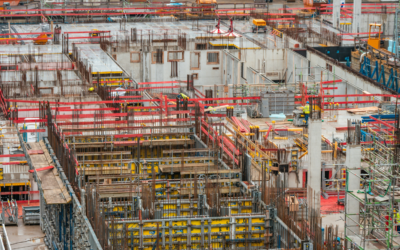As experts in commercial construction, we recognize that at the core of every triumphant project is the construction manager, an integral yet frequently underestimated keystone. So, what do construction managers do exactly? The intent of this blog is to demystify the role of construction managers by exploring their key responsibilities, the essential skills they must possess, and the invaluable advantages they contribute throughout the lifecycle of a construction project.
What Do Construction Managers Do?
As the fabric of the industry, construction managers supervise construction projects from inception to completion, ensuring that the design, quality, safety, and schedule of structures align with client expectations. They are the bridge between the architects’ vision and the realization of the construction project.
The Unseen Masterminds
These professionals must possess a depth of knowledge in construction methodologies, materials, and industry standards. They are responsible for not just the execution of a project but the orchestration of various departments, specialized teams, and external vendors towards a singular goal. In doing so, they uphold the integrity of project schedules, costs, and resources, while steadfastly adhering to legal guidelines and safety standards.
Construction managers are akin to conductors who harmonize the sound of construction activities into a symphony of progress. These construction professionals aim to create solutions for every differing note that may disrupt the project’s momentum.
What Do Construction Managers Do? | Unpacking Their Key Responsibilities
The breadth of the construction manager’s role is considerable, delving into strategic planning, project execution, and post-construction analysis. Here, we dissect the core duties of these professionals, offering a detailed understanding of their day-to-day functions.
Planning and Coordinating Construction Projects
The way in which construction managers plan is the linchpin of a successful construction project. Construction managers work with all stakeholders, including the client, designers, and labor teams, to map out the intricate details. They are involved in everything from site selection and feasibility studies, to resource allocation and decision-making. Their foresight is instrumental in anticipating potential issues and formulating proactive solutions.
Managing Budgets and Resources
A construction site is commonly associated with it’s scale and cost. It’s the construction manager’s responsibility to keep the budget and resources in check. They maintain detailed cost estimates, collaborate with financial managers, and minimize waste. An acute understanding of the economic dynamics of the market is vital to make informed budgetary decisions that will ultimately affect the profitability of the project.
Ensuring Compliance with Regulations and Safety Standards
A certified construction manager acts as the sentinel of regulatory compliance and safety protocols. In this capacity, they stay connected to local and national construction laws to guarantee that all aspects of the project adhere to compulsory standards. Equally vital is the enforcement of safety procedures, safeguarding the on-site labor force from potential hazards.
Supervising and Coordinating Teams
Leadership is a defining trait of a good construction manager. They supervise the work of all construction personnel, including construction workers, contractors, and the construction project manager, to ensure that tasks are completed within the designated parameters of quality and efficiency. Effective communication is the linchpin in this regard, as it provides clarity and direction to teams amidst the construction site’s potential clamor.
Overseeing Project Timelines and Milestones
Time is money in the construction industry. It’s the construction manager’s responsibility to set realistic project timelines that align with client expectations. They continually monitor progress and institute measures to mitigate and address any delays. Time management skills are critical, as is the ability to dynamically adjust timelines in response to unforeseen obstacles.
What Do Construction Managers Do to Become Qualified?
The role of a construction manager is not one that can be entered into lightly. It requires a suite of varied skills and a solid educational foundation. Here, we outline the core competencies that are essential for any aspiring construction manager.
Technical Knowledge and Expertise
Construction managers must possess a comprehensive understanding of every phase of the construction process. This includes being well-versed in the latest construction methods, environmental standards, and energy efficiency measures. A background in engineering, architecture, or construction science is often the starting point for cultivating this expertise.
Leadership and Communication Skills
The art of leadership transcends merely giving orders. Construction managers must inspire confidence and foster a culture of accountability within their teams. They must also be adept communicators, conveying complex technical information in a digestible manner to various stakeholders.
Problem-Solving and Decision-Making Abilities
The construction environment is filled with unforeseen challenges that demand quick, effective resolutions. Construction managers must possess quick-thinking skills to evaluate situations critically and make informed decisions that will not only resolve immediate issues but also align with the project’s long-term objectives.
Time Management and Organizational Skills
Balancing multiple elements of a construction project requires impeccable time management and organizational skills. Construction managers are often juggling multiple tasks simultaneously, all of which demand a meticulous focus on detail without compromising the bigger picture.
What Do Construction Managers Do? | Unpacking the Benefits of Hiring Construction Managers
The comprehensive expertise that construction managers bring to projects have a wealth of benefits. Their presence ensures that projects are not just completed, but are completed successfully.
Efficient Project Management
Efficient project management is the cornerstone of any successful construction undertaking, and this is where construction managers shine brightly. With their seasoned project management skills, they create a master plan that carefully coordinates all stages of construction, from the foundation to the final fixture installations.
Utilizing cutting-edge technology and project management software, they are able to monitor progress in real-time, make adjustments on the fly, and keep all team members aligned with the current objectives and timelines. This leads to a reduction in waste, both in terms of materials and time, ensuring that projects are not only completed swiftly but also sustainably. Their proactive communication keeps every stakeholder in the loop, allowing for quick decision-making and avoiding costly missteps that can cause project delays.
Minimizing Risks and Delays
Navigating the complexities of construction, construction managers deftly mitigate risks by preempting challenges like shortages or compliance updates. They strategize proactively, preparing contingency plans for swift implementation, thereby preventing workflow interruptions. Their holistic approach prioritizes safety and workers’ well-being, as they inspect sites and enforce standards to reduce accidents and delays.
Construction managers also streamline scheduling and resource allocation to ensure project elements interlock seamlessly. This facilitation and timing mastery underpin their effective risk reduction and progress maintenance in the ever-evolving construction landscape.
Cost-Effectiveness
Cost-effectiveness stands as one of the prime deliverables construction managers bring to the table. Through meticulous monitoring of expenses and an unwavering commitment to minimizing waste, they safeguard the financial health of a project. Construction managers employ their deep understanding of the market to make informed purchasing decisions, negotiating for the best prices without compromising quality.
By optimizing the use of resources – be it labor, materials, or equipment – they prevent unnecessary expenditures that can bloat the budget. This precision in managing finances, combined with judicious decision-making, forms the foundation of a project’s economic viability, ensuring that each dollar is spent with the utmost efficacy. Their proactive management style does not only preserve financial resources but also adds value to the project, ultimately benefiting all stakeholders involved.
Quality Control and Assurance
Quality control and assurance remain paramount in the construction industry, a testament to which is seen in the vigilant efforts of construction managers who serve as the project’s custodians of excellence. They are keenly aware that their reputation, along with the structural integrity and safety of the built environment, is contingent on stringent adherence to industry benchmarks.
With a discerning eye, construction managers meticulously inspect all facets of the project – from the selection of materials through each phase of construction – to ensure compliance with all applicable codes and regulations. This commitment to quality extends beyond mere adherence to specifications; it embodies a conviction to transcend the ordinary and achieve the exceptional. Their proactive oversight helps to preemptively address any discrepancies that could later burgeon into significant defects, thereby assuring the longevity and reliability of the construction project at hand.
What Do Construction Managers Do in Residential and Commercial Construction?
While the core principles of construction management remain consistent across various domains, there are significant differences between the roles of residential and commercial construction managers.
What Do Construction Managers Do in Terms of Residential Construction?
Residential construction requires a keen understanding of the personal and emotional elements associated with creating someone’s home. These self-employed construction managers are often involved in smaller, more localized projects, where attention to detail and client interaction play a pivotal role in the project’s success.
What Do Construction Managers Do in Terms of Commercial Construction?
Conversely, commercial construction managers navigate larger, more complex projects, where the scale and functionality of the structure often outweigh personalization. They must be adept at managing a broad range of stakeholders and more extensive regulatory and safety requirements.
The distinction between the two sectors underscores the adaptability and diverse skill set that construction managers bring to their profession.
What Do Construction Managers Do? | Conclusion
The unsung heroes of the construction industry, construction managers, are integral to the successful execution of construction projects. Their roles pivot on a dynamic set of responsibilities that demand a blend of technical expertise, leadership, foresight, and management skills. By hiring construction managers, businesses can benefit from efficient project management, minimized risks, cost-effectiveness, and impeccable quality control.
If you’re seeking commercial construction management services, look no further than South Coast Improvement Company. Our seasoned professionals possess a profound understanding of the commercial construction landscape, allowing them to navigate every project phase with exceptional precision. As your trusted partner, we dedicate ourselves to the highest standards of quality, ensuring that every element aligns with your vision – down to the final brick. Choosing South Coast Improvement Company means placing your trust in a team that not only meets expectations but consistently surpasses them. Contact us today to collaborate with industry leaders who transform every project into a testimony of enduring craftsmanship and detailed care.
View Our Work
Aspen Dental
Partnering with The Aspen Group on the construction of a new Aspen Dental facility that’s functional & welcoming for patients & staff alike. South Coast Improvement Company was awarded the construction of a new Aspen Dental facility in Killingly, CT. The...
Springhouse Senior Living – HumanGood
Designed to enhance comfort & functionality. South Coast Improvement company was hired by HumanGood for an interior and exterior renovation at Springhouse Senior Living. Our skilled teamtransformed the 2nd through 5th floor common areas into brighter, more...














